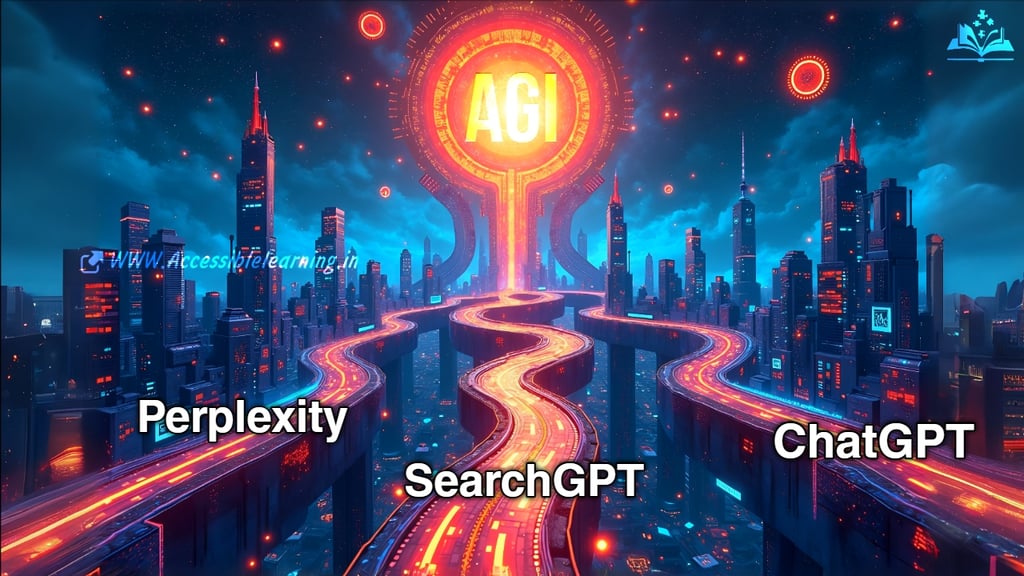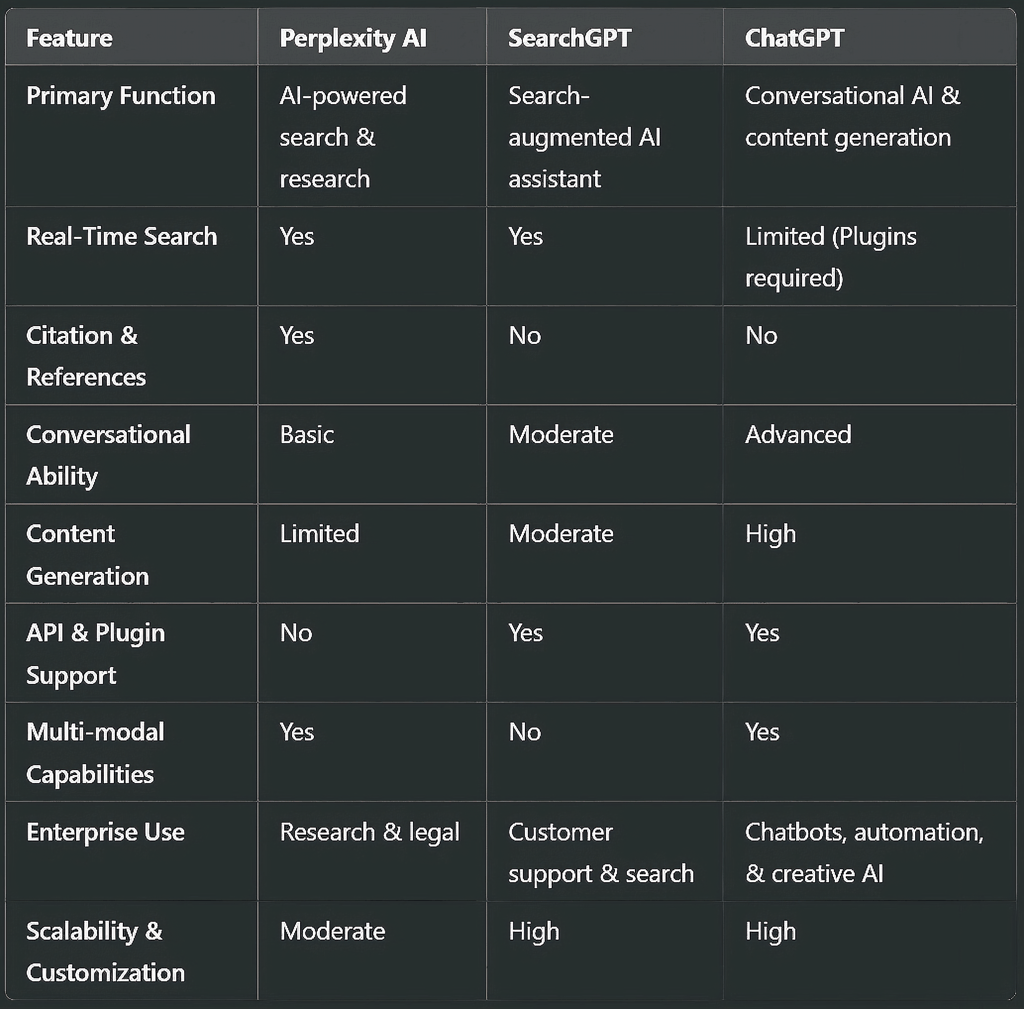
Perplexity AI vs SearchGPT vs ChatGPT: Which AI Model Suits Your Needs Best?
Compare Perplexity AI, SearchGPT, and ChatGPT in-depth. Learn their features, differences, use cases, and technical capabilities to find the best AI for research, search, and conversations.
AI ASSISTANTAI/FUTUREEDUCATION/KNOWLEDGEEDITOR/TOOLS
Sachin K Chaurasiya
2/12/20256 min read


The AI revolution has brought several powerful models to the forefront, each excelling in different areas of natural language processing (NLP) and AI-driven assistance. Among these, Perplexity AI, SearchGPT, and ChatGPT stand out as three major contenders in the AI-powered search and conversational AI space. While all three utilize advanced machine learning techniques, they serve different purposes and have unique strengths. In this article, we will compare Perplexity AI, SearchGPT, and ChatGPT to help you understand their capabilities, differences, and best use cases.
What is Perplexity AI?
Perplexity AI is an AI-powered search engine that combines retrieval-augmented generation (RAG) with natural language processing (NLP) to provide precise and well-referenced search results. Unlike traditional search engines that display a list of links, Perplexity AI aims to generate direct, well-researched answers sourced from reliable references. It is designed to enhance information retrieval, summarization, and fact-checking.
Key Features
Contextual search engine: Provides direct answers instead of just listing search results.
Citations and references: Ensures transparency by citing sources.
Real-time data retrieval: Pulls information from up-to-date web sources.
User-friendly interface: Provides easy-to-read response formats.
AI-powered summarisers: Generates concise, well-structured answers.
Interactive Q&A capabilities: Users can refine their questions for more customized responses.
Cross-domain expertise: Covers a wide range of topics, from science to current events.
Powered by GPT-4: Uses cutting-edge AI language models for better understanding.
Multi-modal capabilities: Can process text and images for better context understanding.
Best Use Cases
Fact-checking and research-based inquiries.
Users who want precise answers with citations.
Academics and professionals are looking for well-referenced data.
Quick summarization of news, articles, and research papers.
Enhancing business intelligence and analytics with AI-driven insights.
Knowledge discovery for enterprise solutions and AI-powered legal research.
🟢 Strengths
Real-Time Search: Perplexity AI excels in providing up-to-date information, making it a powerful alternative to traditional search engines.
Citations & References: It offers sourced and cited responses, enhancing credibility and reliability.
High Accuracy with RAG: Uses retrieval-augmented generation (RAG) to pull data from verified sources, reducing hallucinations.
Fast and Efficient: Provides quick and direct answers without unnecessary fluff.
🔴 Weaknesses
Limited Conversational Ability: Unlike ChatGPT, it does not engage in deep, interactive conversations.
Not Ideal for Content Creation: It primarily focuses on search and retrieval rather than generating long-form text.
No Multimodal Support: Lacks image or voice input capabilities, restricting its usability in diverse AI applications.
Customization Restrictions: It does not offer extensive fine-tuning options or API flexibility compared to ChatGPT.


What is SearchGPT?
SearchGPT is a variant of OpenAI’s GPT models designed for search-related queries. Unlike traditional GPT models, SearchGPT enhances search capabilities by integrating with external databases, APIs, and search engines. It is built to provide intelligent search augmentation, contextual answers, and personalized recommendations.
Key Features
Search-enhanced AI: Uses external search engines and databases to refine responses.
Context-aware responses: Provides more accurate and dynamic results.
API integration: Works with various data sources for real-time results.
Optimized for knowledge discovery: Helps users find relevant information efficiently.
AI-assisted web search: Can summarize web pages and provide structured insights.
Multi-source aggregation: Combines data from various sources to generate better responses.
Scalability: Can be optimized for enterprise-level applications.
Uses transformer-based architecture: Leverages advanced machine learning techniques for better context recognition.
Advanced query expansion: Enhances user queries for optimal search results.
Best Use Cases
AI-powered web searches with natural language understanding.
Research-based queries that require contextual awareness.
Users are looking for a hybrid of AI conversation and search engine functionalities.
Businesses needing AI-driven customer support and search optimization.
Personalized AI search experiences tailored to user preferences.
Knowledge graphs and AI-powered document analysis.
🟢 Strengths
Enhanced Search with AI: Integrates AI with search results, refining responses dynamically.
Good for Research & Fact-Checking: Can analyze multiple sources, making it useful for detailed inquiries.
API Integration Available: Allows businesses and developers to customize its use in applications.
Faster Than Traditional Search Engines: Uses AI to streamline query handling and reduce irrelevant results.
🔴 Weaknesses
Less Conversational: While it understands context, it is not optimized for natural conversation like ChatGPT.
May Lack Citations: Unlike Perplexity AI, it does not always provide direct references for its information.
Dependent on External Sources: The quality of responses depends on the databases it connects with, which may limit accuracy.
Not Designed for Creative Writing: Lacks strong text generation capabilities, making it less effective for blog writing or storytelling.


What is ChatGPT?
ChatGPT is OpenAI’s conversational AI model designed for natural, human-like interaction. It excels in text generation, creative writing, customer support, coding assistance, and more. Unlike Perplexity AI and SearchGPT, ChatGPT does not primarily function as a search engine but as a conversational assistant powered by advanced language modeling.
Key Features
Conversational AI: Engages in human-like dialogue.
Creativity and content generation: Writes articles, scripts, poetry, and more.
Code assistance: Helps with programming, debugging, and explanation of code.
Task automation: Can assist with scheduling, reminders, and knowledge retrieval.
Customizable AI: Works with fine-tuning and plugins to expand functionality.
Multi-turn dialogue memory: Remembers previous interactions for more coherent conversations.
Voice and multimodal capabilities: Can process text, images, and voice inputs (depending on the version).
Supports GPT-4 Turbo: Uses a highly optimized model for faster and more cost-effective responses.
Plugin and API extensibility: Integrates with third-party tools for enhanced capabilities.
Best Use Cases
General-purpose AI conversations and chatbot applications.
Writing and content creation (blogs, emails, creative writing).
Learning and tutoring assistance.
Coding and development support.
AI-powered customer service and automation.
Personalized AI experiences through plugins and API integrations.
AI-powered brainstorming, language translation, and summarization.
🟢 Strengths
Best for Conversations: ChatGPT is highly interactive, making it great for discussions, brainstorming, and chat-based assistance.
Powerful Content Generation: Excels in writing blogs, articles, essays, code, and creative text formats.
Customizable & API-Friendly: Developers can fine-tune it for specific use cases, adding custom instructions or plugins.
Multimodal Capabilities: The pro version supports text, image generation, and document analysis, making it more versatile.
🔴 Weaknesses
No Built-in Real-Time Search: Unlike Perplexity AI and SearchGPT, it does not fetch live information unless integrated with browsing tools.
No Citations by Default: Without additional tools or plugins, ChatGPT does not provide sourced references, which can be a drawback for research-heavy tasks.
Occasional Hallucinations: It sometimes generates incorrect or misleading information when unsure.
Limited Free Version Capabilities: The best features (such as GPT-4 and web browsing) are locked behind the Pro version.


FAQs
What is the main difference between Perplexity AI, SearchGPT, and ChatGPT?
Perplexity AI is an AI-powered search engine providing direct answers with citations.
SearchGPT is an AI-enhanced search assistant that integrates with external databases.
ChatGPT is a conversational AI designed for chat-based interactions, content creation, and coding.
Which is better for real-time search: Perplexity AI, SearchGPT, or ChatGPT?
Perplexity AI and SearchGPT both provide real-time search functionality, but Perplexity AI offers citations and source references.
ChatGPT does not have built-in real-time search but can access external information using plugins.
Can Perplexity AI replace Google Search?
Perplexity AI is designed as an AI-enhanced search engine that provides direct answers, making it more efficient for research-based queries. However, it does not fully replace Google Search, which offers broader indexing, ads, and diverse query handling.
Is SearchGPT better than ChatGPT for research?
Yes, SearchGPT is better suited for research-oriented tasks because it integrates external databases and search engines for real-time, context-aware responses. ChatGPT excels in conversations and content generation but lacks direct search capabilities without plugins.
Does ChatGPT provide citations for its responses?
No, ChatGPT does not provide citations unless used with specific retrieval-augmented generation (RAG) models or plugins. Perplexity AI is a better option for fact-checked and referenced answers.
Which AI model is best for academic research?
Perplexity AI is ideal for academic research because it provides cited sources and concise answers.
SearchGPT is useful for academic searches that require cross-referencing multiple sources.
ChatGPT is good for summarizing research but does not cite sources directly.
Is Perplexity AI free to use?
Yes, Perplexity AI offers a free version, but premium features (such as advanced AI capabilities) may require a subscription.
Can I integrate SearchGPT or ChatGPT into my business?
Yes, both SearchGPT and ChatGPT offer API integrations for businesses, customer support, and automation.
Which AI is best for coding assistance?
ChatGPT (GPT-4 Turbo) is the best choice for coding, debugging, and software development support. Perplexity AI and SearchGPT focus more on search and research-based tasks.
How does SearchGPT differ from Perplexity AI in technical implementation?
Perplexity AI uses retrieval-augmented generation (RAG) to fetch data and provide fact-based responses.
SearchGPT integrates external APIs to refine search responses dynamically.
ChatGPT primarily relies on pre-trained language models with optional web browsing plugins.


Which One Should You Choose?
Choose Perplexity AI if you need an AI-powered research assistant that provides well-referenced answers and fact-checked information.
Choose SearchGPT if you want a hybrid AI search tool that integrates AI with traditional search engine functionality.
Choose ChatGPT if you're looking for a powerful conversational AI that excels in text-based interactions, writing, and coding assistance.
Each of these AI models serves a distinct purpose, and the best choice depends on your specific needs. Perplexity AI is perfect for precise research, SearchGPT balances AI-powered search and retrieval, and ChatGPT shines in conversational and creative applications. As AI technology continues to evolve, these tools will become even more sophisticated, offering enhanced functionalities and better user experiences.
Subscribe To Our Newsletter
All © Copyright reserved by Accessible-Learning Hub
| Terms & Conditions
Knowledge is power. Learn with Us. 📚


